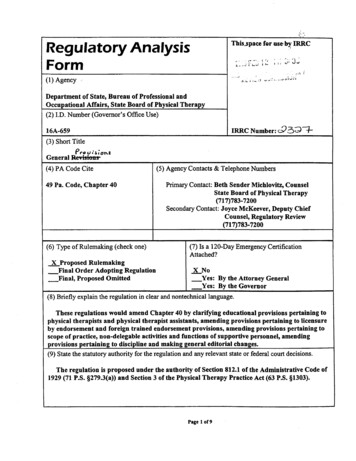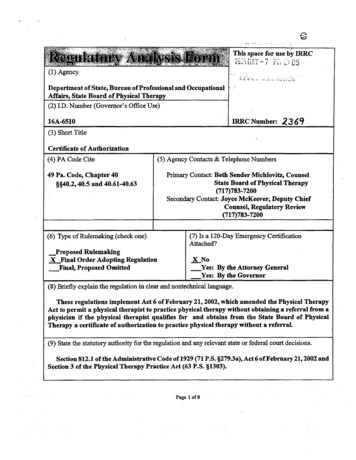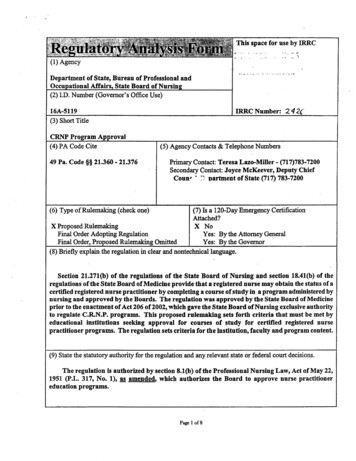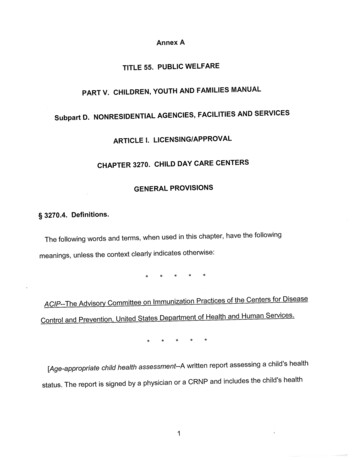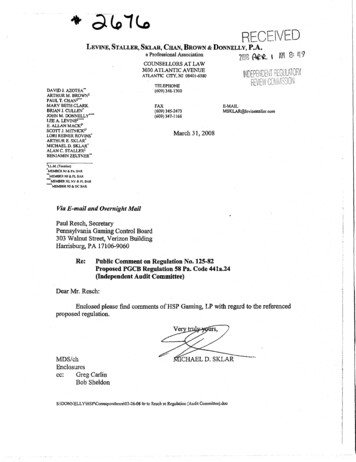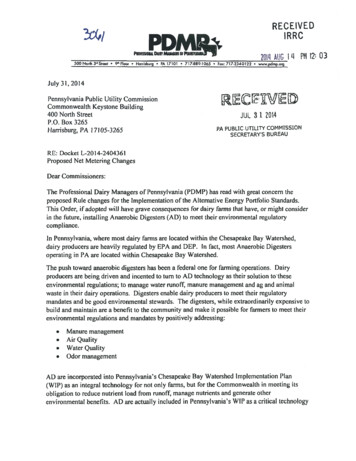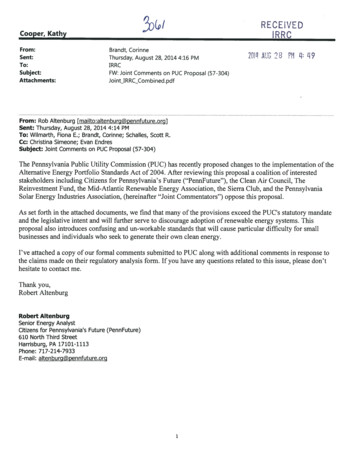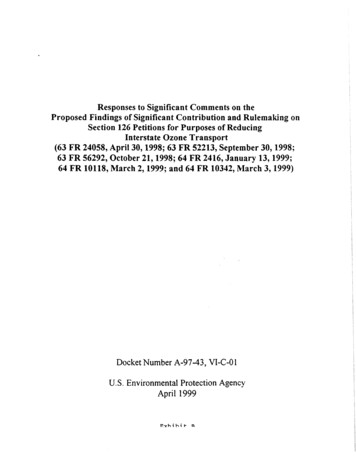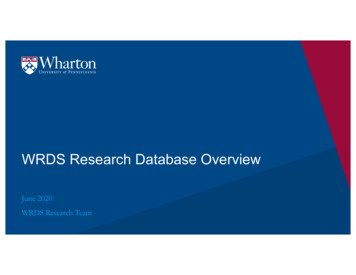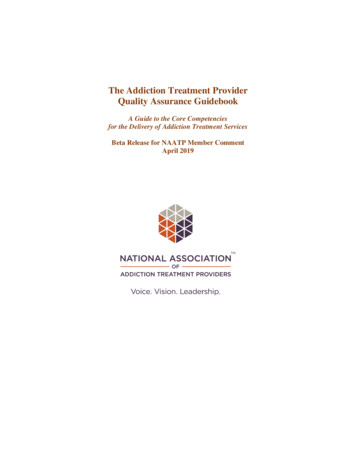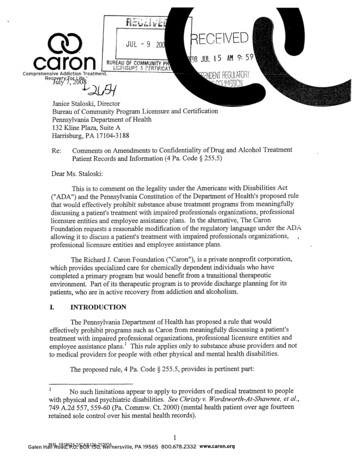
Transcription
GOcaronComprehensive Addiction Treatment.Janice Staloski, DirectorBureau of Community Program Licensure and CertificationPennsylvania Department of Health132 Kline Plaza, Suite AHarrisburg, PA 17104-3188Re:Comments on Amendments to Confidentiality of Drug and Alcohol TreatmentPatient Records and Information (4 Pa. Code § 255.5)Dear Ms. Staloski:This is to comment on the legality under the Americans with Disabilities Act("ADA") and the Pennsylvania Constitution of the Department of Health's proposed rulethat would effectively prohibit substance abuse treatment programs from meaningfullydiscussing a patient's treatment with impaired professionals organizations, professionallicensure entities and employee assistance plans. In the alternative, The CaronFoundation requests a reasonable modification of the regulatory language under the ADAallowing it to discuss a patient's treatment with impaired professionals organizations,professional licensure entities and employee assistance plans.The Richard J. Caron Foundation ("Caron"), is a private nonprofit corporation,which provides specialized care for chemically dependent individuals who havecompleted a primary program but would benefit from a transitional therapeuticenvironment. Part of its therapeutic program is to provide discharge planning for itspatients, who are in active recovery from addiction and alcoholism.I.INTRODUCTIONThe Pennsylvania Department of Health has proposed a rule that wouldeffectively prohibit programs such as Caron from meaningfully discussing a patient'streatment with impaired professional organizations, professional licensure entities andemployee assistance plans.1 This rule applies only to substance abuse providers and notto medical providers for people with other physical and mental health disabilities.The proposed rule, 4 Pa. Code § 255.5, provides in pertinent part:1No such limitations appear to apply to providers of medical treatment to peoplewith physical and psychiatric disabilities. See Christy v. Wordsworth-At-Shawnee, et al.,749 A.2d 557, 559-60 (Pa. Commw. Ct. 2000) (mental health patient over age fourteenretained sole control over his mental health records).Galen H WAS?%yG6%# %8fnersvllle, PA 19565 800.678.2332 www.caron.org
(c) Consensual release of information for patient records.(1) With patient's written consent, a program mayrelease information from a patient's records tomedical personnel for the purpose of diagnosis,treatment, or referral of treatment.(6) With the patient's written consent, a programmay disclose information from a patient's recordsto a patient's employers [sic] to further therehabilitation of the patient; or, to a prospectiveemployer who affirmatively expresses that theinformation is sought to enable the employer toengage the patient as an employee. Theinformation released under this paragraph shall belimited to whether the patient has or is receivingtreatment with the program.As will be demonstrated below, the confidentiality provisions of 4 Pa. Code§ 255.5 in both its current and proposed forms are not only inconsistent with theframework established by professional practice and title acts, which envisioncommunication between treatment facilities and impaired professional organizations,their designees, and professional licensure boards, but they also impermissibly infringeupon patients' rights to control release of their own information under Pennsylvania'scommon law and its state constitution, and facially violate the ADA. Alternatively, theADA requires that the Department of Health grant Caron a reasonable modification.These problems can be avoided by rewording the proposed rule as set forth inSection III.H of this comment.II.STATUTORY AND REGULATORY BACKGROUNDA.Summary of Confidentiality Provisions Relating to Drug and AlcoholAbuse and DependenceA plain reading of both the provisions of the Pennsylvania Drug and AlcoholAbuse Control Act and its regulations severely limits the information about substanceabuse treatment that may be released, even with patient consent.Section 8(c) of the Pennsylvania Drug and Alcohol Abuse Control Act provides:All patient records and all information contained thereinrelating to drug or alcohol abuse or drug or alcoholdependence prepared or obtained by a private practitioner,hospital, clinic, drug rehabilitation or drug treatment centershall remain confidential and may be disclosed only with8oo.67:m3pmm%KW
the patient's consent and only (i) to medical personnelexclusively for purposes of diagnosis and treatment of thepatient or (ii) to government or other officials exclusivelyfor the purpose of obtaining benefits due the patient as aresult of his drug or alcohol abuse or drug or alcoholdependence except that in emergency medical situationswhere the patient's life is in immediate jeopardy, patientrecords may be released without the patient's consent toproper medical authorities solely for the purpose ofproviding medical treatment to the patient.71 Pa. Stat. Ann. § 1690.108(c).4 Pa. Code § 255.5 in both its current and proposed amended form similarly limitsthe extent to which substance abuse treatment information may be released, even withpatient consent. Under the proposed regulatory scheme treatment information may bereleased with patient consent to the following individuals and entities, provided particularconditions are satisfied: (1) medical personnel for the purpose of diagnosis, treatment orreferral for treatment; (2) to government officials and third-party payers to obtain benefitsand services as a result of drug abuse or dependence; (3) any lawyers representing thepatient; (4) the patient's probation or parole officer; (5) judges who have imposed asentence conditioned upon treatment or entering a pre-sentence conditional releaseprogram; and (6) to an employer or prospective employer (limited information only).Disclosure without consent is allowed: (1) to medical authorities when thepatient's life is in immediate jeopardy; (2) under a court order issued after an applicationshowing good cause; (3) to law enforcement personnel when the patient committed acrime on the program premises or against program personnel or threatened to commit acrime (limited information only); (4) to appropriate authorities when reporting suspectedchild abuse; (5) for scientific research in accordance with 42 C.F.R. § 2.52; and (6) foraudits or evaluations by governmental or third-party payers or quality control reviewers.No provision is made for communications with impaired professional programs orprofessional licensure boards, either with or without patient consent.B.Summary of the Impaired Professional Provisions of the ProfessionalPractice and Title ActsSeveral professional practice and title acts include provisions for addressing theissues related to impaired professionals. For example, consider § 18 of the ProfessionalPsychologists Practice Act (the "Act"). Section 18 of the Act contemplates the disclosureof treatment information in two instances, both of which do not appear to require patientconsent.First, approved treatment providers for impaired professionals are required torelease information regarding a participant's progress in treatment to the consultant whoacts as a liaison between the provider and the State Board of Psychology (the "Board").800.672%3fm%mKW
The Act allows the Board to appoint a consultant to act as a liaison between the Boardand approved treatment programs for impaired professionals. Pursuant to the Act,approved program providers must disclose to the consultant the "information in [their]possession regarding any impaired professional in treatment which the program provideris not prohibited from disclosing by an act of this Commonwealth, another state or theUnited States." 63 Pa. Stat. Ann. § 1218. If the professional has not progressedsatisfactorily, the consultant must then "disclose to the Board all information in hispossession relevant to the issue of impairment regarding said professional" which theBoard will use to determine the appropriate course of action with regard to suchprofessional's license. An approved program provider who makes a disclosure pursuantto this arrangement is immune from civil liability for the disclosure or its consequences.IdSecond, all other individuals and providers, including any hospital or health carefacility that does not act in a treatment capacity to an impaired professional in anapproved treatment program, must report to the Board information regarding aprofessional's lack of treatment or mental or physical incompetence to carry out his or herduties. 63 Pa. Stat. Ann. § 1218(f). A health care facility that makes such a report to theBoard in good faith and without malice is immune from any civil or criminal liability thatmay arise from such report. Id Approved treatment programs acting in a treatmentcapacity toward the impaired professional are exempt from this mandatory reportingrequirement. IdIn addition to the Professional Psychologists Practice Act, the followingprofessional practice and title acts contain similar provisions: the Chiropractic PracticeAct (63 Pa. Stat. Ann. § 625.509); the Dental Law (63 Pa. Stat. Ann. § 130g ); theMedical Practice Act of 1985 (63 Pa. Stat. Ann. § 422.4); the Professional Nursing Law(63 Pa. Stat. Ann. § 224.1); the Practical Nurse Law (63 Pa. Stat. Ann. § 666.2); theOptometry Practice Act (63 Pa. Stat. Ann. § 244.7a); the Osteopathic Medical PracticeAct (63 Pa. Stat. Ann. § 271.16c); the Pharmacy Act (63 Pa. Stat. Ann. § 390-7); thePodiatry Practice Act (63 Pa. Stat. Ann. § 42.21b); the Social Workers, Marriage andFamily Therapists and Professional Counselors Act (63 Pa. Stat. Ann. § 1915 ); theSpeech, Language and Hearing Licensure Act (63 Pa. Stat. Ann. § 1717.1); and theVeterinary Medicine Practice Act (63 Pa. Stat. Ann. § 485.26a).Pursuant to these acts, the Pennsylvania Department of State has established theDivision of Professional Health Monitoring Programs ("PHMP") of the Bureau ofProfessional & Occupational Affairs (BPOA) in order to allow professionals who sufferfrom a physical or mental impairment, such as chemical dependency, to be connectedwith an appropriate approved treatment provider and receive monitoring and treatmentdesigned to ensure that such professionals can safely practice their licensed profession.PHMP is comprised of two programs: the Voluntary Recovery Program (VRP) and theDisciplinary Monitoring Unit (DMU). Both programs require treatment providers toshare the following patient information with the PHMP:800.67(8%
(i)participation in treatment, including the estimated length oftreatment, type of treatment services provided, attendance, anddate and type of treatment termination;(ii)diagnosis/prognosis, including a diagnostic summary by thetreatment provider with treatment recommendations;(iii)the nature of the project, including clinical issues to be addressed;treatment methodology and model to be utilized by the provider;and any referrals to support groups and/or another provider forsupportive services not available from this treatment provider;(iv)a brief description of the progress in treatment; and(v)a short statement documenting the type and frequency of anyrelapse into the use of any mood altering substance, includingalcohol, for which the client does not have a valid prescription.The above information is the information that may be released under the currentbut not proposed version of 4 Pa. Code § 255.5, although the current version of 4 Pa.Code § 255.5 does not provide for the release of this information to PHMP projects.III. LEGAL CHALLENGES TO THE PROPOSED RULE AND HOW TO FIXTHE RULEA.The confidentiality provisions of 4 Pa. Code § 255.5 are inconsistentwith the framework established by professional practice and title acts,which envision communication between treatment facilities andimpaired professional organizations, their designees, and professionallicensure boardsSection § 255.5 of the Pennsylvania Code does not specifically permit disclosureof treatment records to professional licensing boards or the consultants who work asliaisons between treatment providers and such licensing boards. However, section 255.5cannot be reviewed in isolation but rather must be read in conjunction with the impairedprofessional provisions noted above. The impaired professional provisions clearlycontemplate the sharing of information between the approved providers and the licensingboard consultants. To interpret section 225.5 as prohibiting the disclosure of treatmentrecords to professional licensing boards or the consultants who work as liaisons betweentreatment providers and such licensing boards would interfere with the impairedprofessional provisions and have the practical effect of eliminating them. Section 255.5should not be interpreted in this way. Indeed, a state regulation cannot be drafted orinterpreted in such a way as to be inconsistent with the overall statutory scheme.The impaired professional provisions appear to allow the sharing of patientinformation without the consent of the patient. More specifically, they discuss thesharing of information without any reference to the need for the patient's consent. Whilethe need for patient consent can be debated, what cannot be debated is that they800.67m ###&K&?f
unquestionably allow the sharing of information with the patient's consent; otherwise, thedisclosures contemplated by the provisions could not take place.B.The confidentiality provisions of 4 Pa. Code § 255.5 are inconsistentwith the well-established practice of PHMP and its interpretation of§ 255.5 as allowing communication between PHMP programs andtreatment facilitiesPHMP has acted as a liaison between the approved treatment providers andvarious licensing boards for over twenty (20) years. During that period, it is ourunderstanding from conversations with PHMP that PHMP has received treatmentinformation regarding licensees from various approved treatment providers throughoutthe Commonwealth of Pennsylvania. It is our understanding that PHMP does not viewthis collaborative sharing of treatment information as a violation of § 255.5. In fact, theinformation sought from treatment providers mirrors the information that may be releasedto approved individuals and entities pursuant to § 255.5(b) as currently enacted.C.The confidentiality provisions of 4 Pa. Code § 255.5 stifle impairedprofessionals' ability to consent to communications between treatmentfacilities and impaired professional organizations, their designees, andprofessional licensure boards, thus limiting treatment options inPennsylvania and increasing the likelihood that impairedprofessionals will not seek the treatment they need to rehabilitate andpractice their professions safelyProhibiting individuals from consenting to the release of their records to impairedprofessional organizations, professional licensure entities, and employee assistance plansinterferes with and may prevent successful treatment of substance abuse addiction andrehabilitation on a variety of fronts. Employees that need to communicate with impairedprofessional organizations and licensure entities in order to maintain their professionallicenses may be forced to seek treatment outside of Pennsylvania in states that allow suchconsensual disclosure to take place. Individuals seeking treatment need immediate care;Pennsylvania professionals forced to leave Pennsylvania to enter treatment programs thatallow them to release information as necessary with their informed consent will delay andpossibly forego treatment. In addition, a lack of communication between treatmentfacilities, impaired professional organizations and licensure entities may result inimpaired professionals continuing to practice while battling substance abuse addictions.This presents not only a danger to the impaired professional, but also to the public atBecause the confidentiality provisions of 4 Pa. Code § 255.5 impose additionalrestrictions on the manner in which substance abuse records may be shared with anyinterested parties beyond those which apply to individuals with other mental health ormedical problems, even with the patient's consent, such regulations discriminate againstindividuals who suffer from substance abuse as opposed to other mental health ormedical problems. Further, as a practical matter, the different treatment with regard tomental health records and substance abuse records makes no sense in the real world in800.67d%3P%WA%W%K
which dual diagnosis is very common. By way of example, pursuant to 50 Pa. Stat. Ann.§7111, records related to an individual's participation in mental health treatment may befreely disclosed with the patient's consent. However, pursuant to 55 Pa. Code § 5100.37,"whenever information in a patient's records relates to drug or alcohol abuse ordependency . . those specific portions of the patient's records are subject to theconfidentiality provisions of section 8(c) of the Pennsylvania Drug and Alcohol AbuseControl Act (71 P. S. § 1690.108(c)), and the regulations promulgated thereunder, 4 Pa.Code § 255.5."Because these proposed provisions severely restrict the information aboutsubstance abuse treatment that may be released, even with the patient's consent, theydiscriminate against individuals who have drug or alcohol problems as opposed to othermental health or medical problems. This proposed rule will be particularly burdensomefor patients who are dually diagnosed and suffer from both mental health and substanceabuse issues as those patients can no longer freely communicate and share their treatmentrecords with any treatment providers, impaired professionals organizations or licensingboards.D.Proposed regulation 4 Pa. Code § 255.5(c)(l) violates patients'common law right to control access to her protected healthinformationPennsylvania case law recognizes that substance abuse patients have a personalright to their treatment records:While we understand that sometimes disclosure of apatient's treatment records to the patient may not betherapeutic, it is unreasonable to deny a patient access toher own information. The purpose of the privilege is toencourage diagnosis and treatment. We believe the right toclaim a privilege is a personal one belonging to theindividual protected by the statute. A patient should nothave to engage in legal proceedings in her quest for copiesof her own treatment records.Sullivan v. Cornerstone Counseling, 49 Pa. D. & C.4th 499, 504-5 (2000) (emphasisadded); Christy v. Wordsworth-At-Shawnee, et ah, 749 A.2d 557, 559-60 (Pa. Commw.Ct.2000).Because the privilege is personal to the patient, Sullivan strongly suggests that animpaired professional should be able to exercise informed consent and allow her providerto discuss those records and her treatment with impaired professionals organizations,professional licensure entities and employee assistance plans.8oo.67a%s#m%iw
E.Proposed regulation 4 Pa. Code § 255.5(c)(l) violates the PennsylvaniaConstitution's Right to PrivacyIn In re "B", 394 A.2d 419 (Pa. 1978), the Pennsylvania Supreme Court struckdown a subpoena for a mother's psychiatric records to be used by a juvenile courtpsychologist in determining placement of her son on the ground that the subpoenaviolated the mother's right under the Commonwealth's Constitution:We conclude that in Pennsylvania, an individual's interestin preventing the disclosure of information revealed in thecontext of a psychotherapist-patient relationship has deeperroots than the Pennsylvania doctor-patient privilege statute,and that the patient's right to prevent disclosure of suchinformation is constitutionally based. This constitutionalfoundation emanates from the penumbras of the variousguarantees of the Bill of Rights, Griswoldv. Connecticut,[381 U.S. 479, 85 S.Ct. 1678 (1965)], as well as from theguarantees of the Constitution of this Commonwealth . . .In some respects these state constitutional rights parallelthose of the Federal Constitution, see especially,Amendments 1,3,4,5, and 9. In other respects ourConstitution provides more rigorous and explicit protectionfor a person's right of privacy e.g., Article I, Sections 1, 3,4, 7 and 11.394 A.2d at 425. Thus, the Pennsylvania Supreme Court recognizes that Pennsylvania'sstate constitutional right to privacy is at least as rigorous as the Federal one.While Pennsylvania state courts have not addressed the precise contours of theright to privacy, the United States Supreme Court has recognized two privacy rights: anautonomy-based right to privacy and a right to control the dissemination of sensitiveinformation about one's self. See Whalen v. Roe, 429 U.S. 589, 599-600 (1977); UnitedStates v. Westinghouse Elec. Corp., 638 F.2d 570, 578 (3d Cir. 1980) (interpretingWhalen as creating a broad constitutional right to informational privacy).The Pennsylvania statute and proposed rule implicate the latter privacy right.While most information dissemination cases address the right to prevent sensitiveinformation from becoming public, nothing in those cases undermines the right of theindividual to control the dissemination of his or her his or her personal healthinformation.2Notably, federal law generally allows patients to control the dissemination of theirpersonal health information through informed consent. See Confidentiality of Alcoholand Drug Abuse Patient Records Act, 42 U.S.C.A. § 290dd-2, the Health InsurancePortability and Accountability Act ("HIPAA") Regulations at 45 C.F.R. § § 164.508,164.512.8
F.Proposed regulation 4 Pa. Code § 255.5(c)(l) violates the ADA on itsface because it discriminates against people with substance abusedisabilities1.Overview of the ADAThe ADA is intended "to provide a clear and comprehensive national mandate forthe elimination of discrimination against individuals with disabilities." 42 U.S.C.§ 12101(b). Title II of the ADA prohibits discrimination by public entities, includingstates, on the basis of disabilities:No qualified individual with a disability shall, by reason ofsuch disability, be excluded from participation in or bedenied the benefits of the services, programs, or activitiesof a public entity, or be subjected to discrimination by anysuch entity.42 U.S.C. § 12132. In enacting the ADA, Congress found that "discrimination againstindividuals persists in such critical areas as . . . health services . . . . " 42 U.S.C.§ 12101(3). The ADA's reference to "programs, services, or activities" of a public entityhas been construed broadly, to invalidate countless laws and rules, and clearly applies torulemaking such as that challenged here. New Directions Treatment Services v. City ofTkadrng, 490 F.3d 293 (3d Cir. 2007) (invalidating state statute); ay rga/f zcfzoMjggjgarc/z aW TreafmeMf, 7«c. v. Ofy qf,WzWz, 179 F.3d 725, 730 (9th Cir. 1999)(invalidating ordinance); Jones v. Gale, 405 F. Supp. 2d 1066 (D. Neb. 2005)(invalidating state constitutional provision), affd on other grounds, 470 F.3d 1261 (8thCir. 2006); #Zg» 5". v. f7onWa oa q/" 7- ca7Mmgrf, 859 F. Supp. 1489 (S.D. Fla.1994) (invalidating questions on bar application and follow-up inquiries regardingtreatment for mental illness).2.The ADA protects recovering alcoholics and addictsThe legislative history of the ADA indicates that it was intended to apply torecovering alcoholics and addicts. The committee reports state that the term "physical ormental impairment" includes, inter alia, "drug addiction [ ] and alcoholism." H.R.Rep.No. 101-485(11), at 51 (1990), reprinted in 1990 U.S.C.C.A.N. 303, 333; accord H.R.Rep.No. 101-485(111), at 28 (1990), reprinted in 1990 U.S.C.C.A.N. 445,451; S.Rep. No.101-116, at 22 (1989), available in WESTLAW, ADA-LH database. See, e.g., Thompsonv. Davis, 295 F.3d 890, 896 (9th Cir. 2002) ("Drug addiction that substantially limits oneor more major life activities is a recognized disability under the ADA.") Miners v.CargzY/ Commwwcafzomy, 7»c, 113 F.3d 820, 823 n. 5 (8th Cir. 1997) (recognizing thatalcoholism is a disability for purposes of the ADA); Office of the Senate Sergeant atvdrmj v. Q0zcg q/'.S'gMafe #%r MpZoymeMf fracfzcgj, 95 F.3d 1102, 1105 (Fed.Cir. 1996)(stating that "it is well-established that alcoholism meets the definition of a disability"under the ADA).8oo.67(mjpm%mww
3.Pennsylvania's statutory and regulator) scheme faciallydiscriminates on the basis of disabilityUnder Pennsylvania law, people with physical and psychiatric disabilities have ageneral right to control access to their treatment records. Christy v. Wordsworth-AtShawnee, et ah, 749 A.2d 557, 559-60 (Pa. Commw. Ct. 2000) (mental health patientover age 14 retained sole control over his mental health records). However, proposed 4Pa. Code § 255.5(c)(l) and related statutes severely limit the control by people withsubstance abuse disabilities over access to their treatment records and information, andtherefore constitute discrimination under the ADA. Doe v. Stincer, 990 F. Supp. 1427(S.D.Fla. 1997), vacafedaHdrg7MW%W6y 175 F.3d 879 (11th Cir. 1999). Summaryjudgment was reinstated on remand.In Doe, Florida law created a general right of access to medical records, butrestricted such access for records of treatment for any mental or emotional condition.The Court first addressed whether medical records access was implicated by the ADA:Whether the statutory access to medical records is a"service, program, or activity" under Title II of the ADA isunclear. The ADA does not define these terms, the Courthas uncovered no Eleventh Circuit authority which shedslight on this issue, and decisions from other Circuits aresimilarly sparse. However, this issue is academic becauseTitle II's anti-discrimination provision contains "catch-all"language that "prohibits all discrimination by a publicentity, regardless of the context." Innovative Health.Syjfemj, #zc. v. C#y qfPPTzzfg f famr, 117 F.3d 37, 44 (2dCir. 1997).Id at 1431.The Court then held that the Florida statute discriminated against people withpsychiatric disabilities:[T]he Florida statute does more than distinguish between thementally and physically disabled, the statute excludes everyonewho has received treatment for a "mental or emotional condition"from the universe of all patients, including the non-disabled.' Furthermore, although it is not necessarily the case that anindividual who received treatment for a "mental or emotionalcondition" is disabled as that term is defined in the ADA, thestatute has the practical effect of excluding individuals with mentaldisabilities from all other individuals who enjoy this statutoryright. This directly contradicts the relevant Department of Justiceregulations, which state:10
A public entity shall not impose or apply eligibilitycriteria that screen out or tend to screen out anindividual with a disability or any class ofindividuals with disabilities from fully and equallyenjoying any service, program, or activity, unlesssuch criteria can be shown to be necessary for theprovision of the service, program, or activity beingoffered. A public entity may impose neutral rulesand criteria that screen out, or tend to screen out,individuals with disabilities if the criteria arenecessary for the safe operation of the program inquestion.28 C.F.R. § 35.130(b)(8) (emphasis added). Since regulationspromulgated by the Department of Justice interpreting the ADAare entitled to considerable weight, see Kornblau v. Dade County,86 F.3d 193, 194 (1 lth Cir. 1996), the statutory exception ispreempted by the ADA unless the Defendant can establish itsnecessity.M a t 1431-2.G.Caron is entitled to a blanket reasonable modification from theexisting or proposed statutes and rulesTitle II of the Americans with Disabilities Act provides a "clear andcomprehensive national mandate for the elimination of discrimination against individualswith disabilities." 42U.S.C. § 12101(b)(l). Specifically, Title II prohibits state and localgovernments from discriminating against individuals with disabilities. 42 U.S.C.§ 12132.In addition to proscribing facial discrimination on the basis of disability, the ADAalso requires that public entities such as the Department of Health make reasonablemodifications to avoid discrimination on the basis of disability. The reasonablemodification provision of the regulations implementing the ADA requires:A public entity shall make reasonable modifications in policies, practices,or procedures when the modifications are necessary to avoiddiscrimination on the basis of disability, unless the public entity candemonstrate that making the modifications would fundamentally alter thenature of the services, program, or activity.28C.F.R. §35.130(b)(7).Confidentiality statutes and regulations encourage people to seek treatment, andcan help enhance quality of treatment. Blanket confidentiality provisions that cannot bewaived for impaired professionals who risk losing their licenses will discourageprofessionals from seeking treatment for fear of losing their licenses unless treatment11y 5862 52/CAR!26-252926800.67d.#32"wSaK 6n%'fq
information is shared with their EAP or regulatory or licensing entity. Encouragingprofessionals to seek and obtain treatment is of paramount importance, and activemonitoring such treatment by a licensing entity is every bit as important as judicialoversight of probationers and others in the criminal justice system, already plainlyallowed by the statutes and proposed rule.H.How to fix the proposed ruleCaron's concerns can be remedied by deleting certain wording from 4 Pa. Code§ 255.5 (c)(6) and adding other wording as follows:(6) With the patient's written consent, a program maydisclose information from a patient's records to a patient'semployers, impaired professionals organization,professional licensure entity or employee assistance planto further the rehabilitation of the patient; or, to aprospective employer who affirmatively expresses that theinformatio
result of his drug or alcohol abuse or drug or alcohol dependence except that in emergency medical situations where the patient's life is in immediate jeopardy, patient records may be released without the patient's consent to proper medical authorities solely for the purpose of providing medical treatment to the patient. 71 Pa. Stat. Ann .
